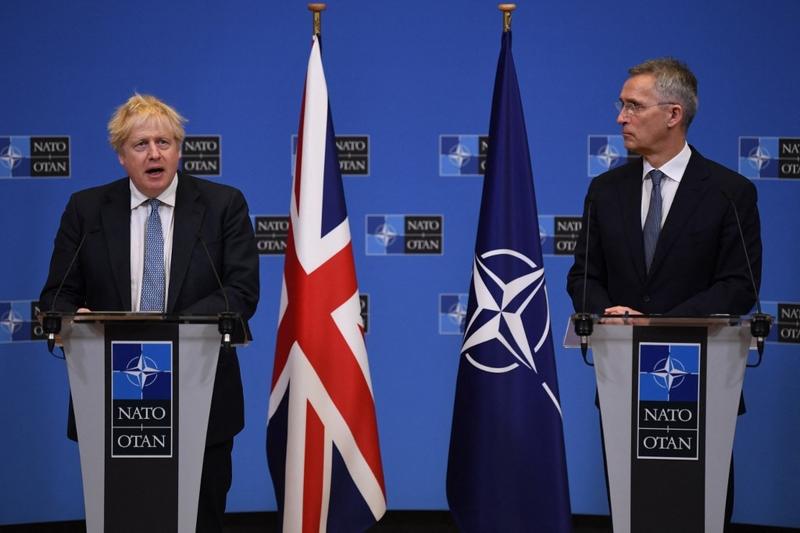 Britain's Prime Minister Boris Johnson (left) speaks during a joint press conference with NATO Secretary General Jens Stoltenberg (right) following a meeting at the NATO headquarters in Brussels on Feb 10, 2022. (DANIEL LEAL / POOL / AFP)
Britain's Prime Minister Boris Johnson (left) speaks during a joint press conference with NATO Secretary General Jens Stoltenberg (right) following a meeting at the NATO headquarters in Brussels on Feb 10, 2022. (DANIEL LEAL / POOL / AFP)
BEIJING- As uncertainty on the Russia-Ukraine border keeps growing, intensive diplomatic efforts are underway, aiming to resolve the tensions through peaceful settlement.
Jens Stoltenberg, secretary general of the North Atlantic Treaty Organization, on Thursday met with British Prime Minister Boris Johnson in Brussels over Russia-Ukraine tensions.
At a joint press conference with French President Emmanuel Macron following their hours-long talks in the Kremlin earlier this week, Russian President Vladimir Putin said Russia's core concerns on security were ignored by the United States and NATO, while the military alliance attempts to lecture Russia on where and how to place its armed forces
Stoltenberg said in a press release that "this is a dangerous moment for European security," underlining that while NATO is prepared for the worst, it is still committed to finding a political solution.
He welcomed Johnson's recent contact with Russian President Vladimir Putin, and the visit of British Foreign Secretary Liz Truss to Moscow. He also welcomed Britain's offer of more troops, ships and planes to NATO.
ALSO READ: Expert: Putin-Macron talks may ease tensions over Ukraine
"This is probably the most dangerous moment. I would say that in the course of the next few days, in what is the biggest security crisis that Europe has faced for decades; we've got to get it right," Johnson told journalists, adding that he doesn't think a decision has yet been taken for "an invasion."
Several Western countries have accused Moscow of having amassed troops near the Ukrainian border, stoking fears of a Russian "invasion."
Moscow denied the accusation, saying that Russia has the right to mobilize troops within its borders to defend its territory as NATO's activities constitute a threat to Russia's border security.
At a joint press conference with French President Emmanuel Macron following their hours-long talks in the Kremlin earlier this week, Putin said Russia's core concerns on security were ignored by the United States and NATO, while the military alliance attempts to lecture Russia on where and how to place its armed forces.
Putin reiterated Russia's opposition to NATO's eastward expansion, adding that Kiev refuses to comply with the 2015 Minsk agreements on a peaceful settlement of the Ukrainian issue and is even attempting to dismantle the deals.
ALSO READ: Ukraine crisis sends shock waves across energy markets
After talks with the British foreign secretary on Thursday, Russian Foreign Minister Sergei Lavrov said that "I cannot say that we have any points of convergence here, but I hope that today's talks have allowed our British colleagues to better understand how significant this issue is for Russia."
Moscow is awaiting a concrete reaction from the West outlining its commitment to the principle of indivisible security, Lavrov added.
Croatian Prime Minister Andrej Plenkovic and his Greek counterpart Kyriakos Mitsotakis on Thursday called for reducing tensions between Ukraine and Russia and supported diplomatic efforts by the international community.
"We advocate the de-escalation of tensions between Ukraine and Russia and between Russia and the West," Plenkovic said in a joint statement after talks with the Greek prime minister, who is on his second visit to Croatia in two and half years.
ALSO READ: Putin meets Macron to discuss Ukraine, European security
"Our common position is to reduce tensions," Mitsotakis said, adding that both support diplomatic channels and the diplomatic efforts of the international community.


